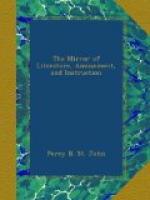[2] Even the greatest hero of the age, who has won all his glory by land, has lately been drinking the Cheltenham waters. The proprietor of the well at which he drank, jocosely observed that his was “the best well-in-town.”
We carry this taste into our money-getting speculations, those freaks of the funds that leave many a man with one unfunded coat. The Thames tunnel is too amphibious an affair to be included in the number; but the ship canal project, the bridge-building mania, and the penchant for working mines by steam, evidently belong to them. The fashion even extends to royalty, since our good King builds a fishing-temple, and dines on the Virginia Water; and the Duke of Clarence, as Lord High Admiral, gives a dejeune a la fourchette between Waterloo and Westminster bridges.
Whoever takes the trouble to read a paper in a late Edinburgh Review on the Nervous System, will doubtless find that much of our predilection for hanging and drowning is to be attributed to this “insular situation.” Every man and woman of us is indeed a self pluviometer, or rain-gauge; or, in plain terms, our nerves are like so many musical strings, affected by every change of the atmosphere, which, if screwed up too tight, are apt to snap off, and become useless; or, if you please, we are like so many barometers, and our animal spirits like their quicksilver; so “servile” are we to all the “skyey influences.” Take, for example, the same man at three different periods of the year: on a fine morning in January, his nerves are braced to their best pitch, and, in his own words, he is fit for any thing; see him panting for cooling streams in a burning July day, when though an Englishman, he is “too hot to eat;” see him on a wet, muggy ninth of November, when the finery of the city coach and the new liveries appear




